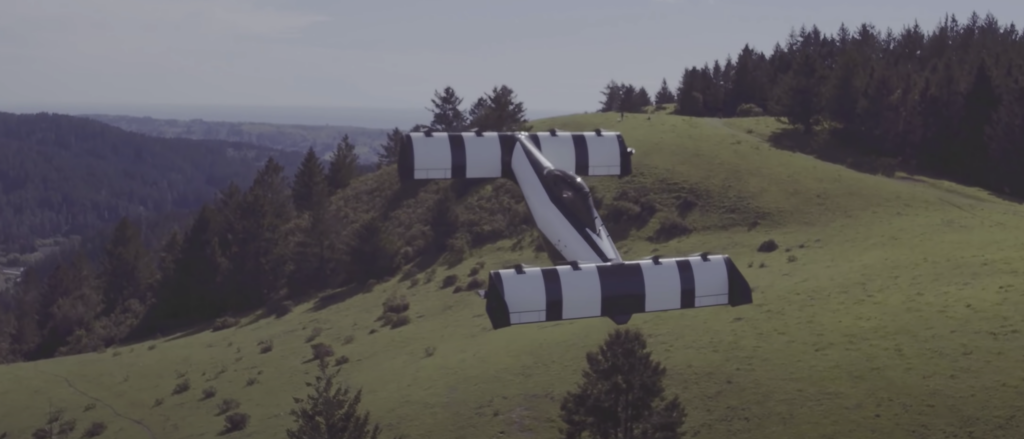
Opener, developer of the BlackFly eVTOL aircraft, recently appointed a new CFO—Jon Campagna. (Photos: Opener)
Electric vertical take-off and landing (eVTOL) developer Opener has designed a Part 103 Ultralight Personal Aerial Vehicle. Called the BlackFly, the eVTOL is a fixed tandem-wing aircraft with eight fixed propulsion units and fly-by-wire electrical controls. The BlackFly’s range is 20+ miles and it can cruise at 60 miles per hour.
The company is led by Ken Karklin, who was appointed as Opener’s CEO in 2022. Just last month, Jon Campagna joined the company as Chief Financial Officer (CFO). “Jon is an exceptional financial leader with a proven track record,” Karklin remarked in the announcement. “His wealth of finance and strategy expertise, combined with his deep understanding of the aviation sector, will be immensely valuable to Opener.”

Jon Campagna, CFO
Campagna recently spoke with Avionics International about his previous experience, his goals as the new CFO, and his perspective on the larger eVTOL industry. Check out our Q&A with Opener’s CFO below:
Avionics International: Can you share some details about your previous experience as CFO at Virgin Galactic and Capella Space Corp? How have these experiences prepared you for your role at Opener?
Jon Campagna: I was at Virgin Galactic for about five and a half years. I focused on building the company to scale as we got closer and closer to commercial operations, setting up the foundation for the accounting and finance organization, and helping to get the company prepared to go public.
I also handled investor relations, tackled key financial aspects of the public offering process, and strategically planned how to move forward with our critical initiatives.
Capella—a synthetic-aperture radar [SAR] satellite company—started commercial operations in January 2021, shortly before I started. While there, I focused on building out the finance organization, putting in new systems, and getting the company ready to scale as they continued to deploy additional assets in space.
Avionics: As the new CFO of Opener, what are your top priorities and strategic goals for the company in the near future?
Campagna: My top priority is to judiciously scale the business as we ramp up towards production and begin sales.
There are numerous strategic opportunities for the company and our platform. Right now we are forging close partnerships with early adopters. This is a huge step toward moving us closer to general release and fulfilling the promise of personal aerial freedom.
We’re making sure we’re in a position to start to take advantage of potential opportunities. I am looking at everything from a finance angle, and seeing how we can continue to grow the business and scale.
How do you plan to leverage your financial expertise to support the growth and expansion of Opener’s eVTOL aircraft for various applications, including recreational, commercial, and public service?
Opener vehicles are appropriate for a wide range of consumer, public service, and military applications. As we expand the scope of what type of products we can offer, there are going to be different regulatory aspects that we need to think about. Making sure that we’re aligned with that, from an insurance perspective and other risk management perspectives, is going to be key.
We’ll continue to scale the business and make sure that we have the infrastructure in place to be able to handle production. We’ll also make sure that the team is in place to be able to support those functions as they grow and as the business continues to become more and more complex.
What are some of the key challenges and opportunities Opener may face as it continues to grow?
I think regulations are a big challenge for the eVTOL space, and I think that the industry will definitely get there. Unlike flying taxis, we’re in a unique position because our light eVTOL aircraft comply with Federal Aviation Regulation Part 103 (US). This means we don’t have the same regulatory requirements as heavier multi-person eVTOL aircraft. That gives us a huge competitive advantage.
As we get into other types of applications, and as regulations evolve, there might very well be new requirements that we have to make sure we’re complying with.
In general, for an eVTOL company, we are very cost-efficient. That puts us in a good position. For many eVTOL companies, building these things to scale takes a lot of capital. We’re vertically integrated and every aspect of our design and production processes are fine-tuned to deliver on our plan.
Hiring is always a challenge—and we want to hire the top talent. We’re in Palo Alto because it’s the hotbed of engineering and other talent, and I think that also helps us significantly.